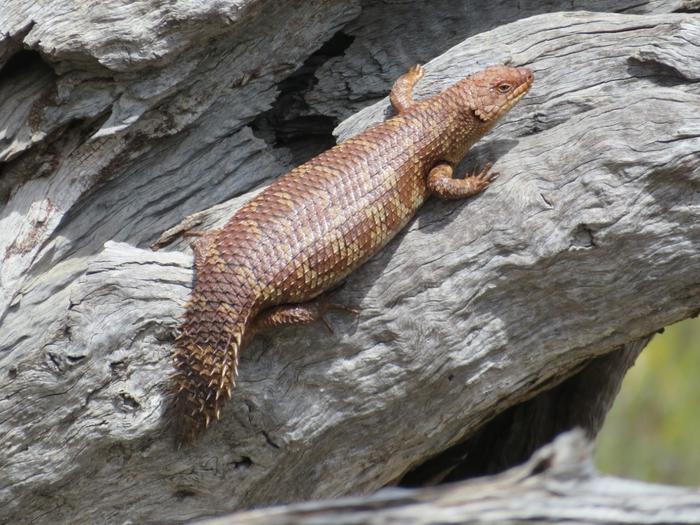The chance sighting of a dead snake beside a sandy track in remote Western Australia, and the investigation of its stomach contents, has led Curtin University researchers to record the first known instance of a spotted mulga snake consuming a pygmy spiny-tailed skink, raising concerns for a similar-looking, endangered lizard species.

Credit: Picture: Holly Bradley
The chance sighting of a dead snake beside a sandy track in remote Western Australia, and the investigation of its stomach contents, has led Curtin University researchers to record the first known instance of a spotted mulga snake consuming a pygmy spiny-tailed skink, raising concerns for a similar-looking, endangered lizard species.
Lead researcher Dr Holly Bradley from Curtin’s School of Molecular and Life Sciences said the discovery of the partially digested pygmy spiny-tailed skink within the snake had implications for the vulnerable western spiny-tailed skink species.
“Found about 300km east of Geraldton and likely killed by a vehicle, the snake’s consumption of the pygmy spiny-tailed skink raises concerns about the susceptibility of similar-sized juvenile western spiny-tailed skinks, which also inhabit the Mid-West region and are classified as endangered,” Dr Bradley said.
“Pygmy spiny-tailed skinks look and act a lot like babies of the endangered western spiny-tailed skink, which live in the same area, so if these snakes are preying on one of them, they are likely also preying on the other.
“Discovering a new potential predator for the western spiny-tailed skink is important for our understanding and management of this rare and threatened species and points to a need for further research to assess and mitigate potential threats to these reptiles.”
Dr Bradley said despite Australia’s rich biodiversity of reptiles, there exists a significant gap in understanding their ecology, with the spotted mulga snake and the pygmy and western spiny-tailed skinks prime examples of understudied and quite mysterious reptiles.
“Understanding predator-prey dynamics can be useful for effective conservation, especially for rare and threatened species such as the vulnerable western spiny-tailed skink,” Dr Bradley said.
“Australia is a hotspot for reptile diversity, but with much of our diversity in the remote, dry, and hot areas which are difficult to access, a lot is unknown about our native snakes and lizards.
“Discovering a new potential predator for western spiny-tailed skink represents an improvement in our understanding of Australian reptile ecology and can better inform conservation efforts and ensure the survival of our native reptilian species.”
The research paper, ‘First record of Egernia predation by the range restricted Spotted Mulga Snake (Pseudechis butleri)’ was published in the journal Australian Zoologist.
Journal
Australian Zoologist
DOI
10.7882/AZ.2024.003
Method of Research
Case study
Subject of Research
Animals
Article Title
First record of Egernia predation by the range restricted Spotted Mulga Snake (Pseudechis butleri
Article Publication Date
31-Jan-2024




